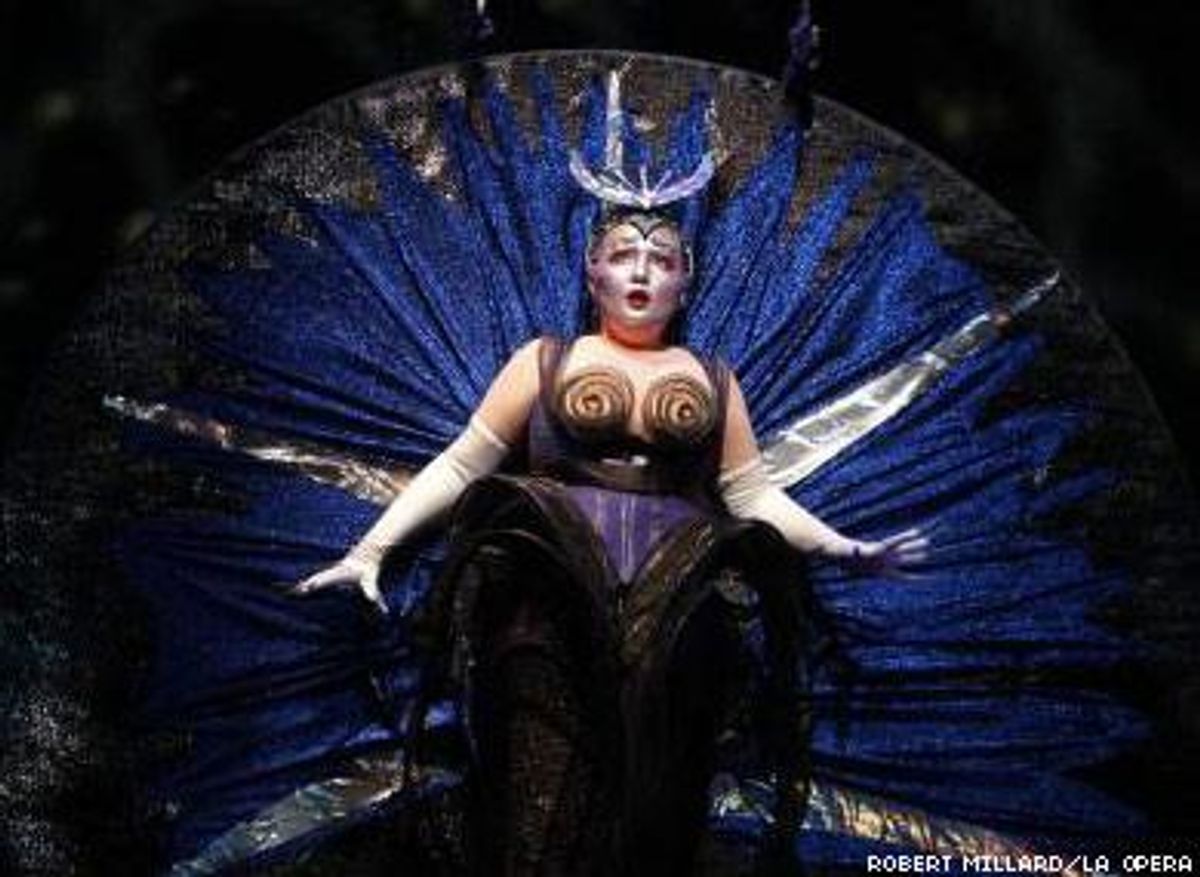It's a
trifle sad when the most praise a critic can muster after
seeing a performance of Mozart's sublime
masterpiece The Magic Flute is for the sets and
costumes, but this, alas, is the situation I find
myself in tonight.
Not that the Los
Angeles Opera performance was bad. All in all the cast
was quite acceptable (with fleeting moments of brilliance),
but The Magic Flute demands more than this. There
are passages in the opera that can raise the soul to a level
that one rarely experiences elsewhere in the theater
-- passages that reassure the listener or viewer that
all is well with humanity, that man has something of
the divine in him after all. All these passages passed by
this evening in a rather lackluster haze. But it was
nice to look at.
First, then, to
what was right -- Peter Hall's Magic Flute is
one of the most enchanting this critic has ever
viewed. In a world where opera is being increasingly
appropriated by wunderkind directors who inflict their own
belabored concepts on the viewer, it's
refreshing to see a production that follows the text
simply for its own sake. Very often in the past I've
found that I've had to attempt a "Vulcan
Mind Meld" with the director in order to
understand what he was getting at -- not so this evening.
Everything in Hall's production works -- and
beautifully so.
From the opening,
where the proscenium arch is decorated to resemble the
giant serpent that threatens our hero, to the very simple
staging of the finale, I found myself breathless with
wonder. Tasteful uses of lighting and projection went
hand in hand with Mozart's magnificent score, and the
costumes were colorful and imaginative. The famous scene in
the first act finale in which Tamino charms wild
animals with his flute (hybrid animals this time --
which we've seen before, but never so endearing as
tonight) elicited well-deserved spontaneous applause
from a delighted audience. The production was just
about perfect in every way.
So, then, what
was wrong? The magic was there in the production but lost
in the music. Matthew Polenzani certainly looked the part as
the Prince Tamino, but while the voice was steady and
flawless, nothing was put across that was distinctly
memorable. The same could be said of Marie
Arnet's Pamina -- a pretty voice, but with little
personality of its own. "Ach, Ich Fuhls"
has never seemed less compelling.
L'ubica
Vargicova's Queen of the Night was far worse.
Although she navigated the role's daunting
coloratura passages without much trouble, much of her
singing was a bit squally and hard on the ear, with almost
no personalization of the role. Her curtain call,
however, elicited much cheering from the crowd -- I
wondered if my comrades in the stalls had heard the
same performance I had.
One of the
established stars of the cast was Nathan Gunn, and he
didn't disappoint. In the past few years he has
made the role of Papageno something of a calling card,
and he certainly knows how to pull out all the stops
as far as charm. Besides that, Gunn is one of those rarities
in the opera world -- a real sex symbol, and he was
definitely sexy this evening, even through all the
Papageno feathers and makeup. But we expect Gunn to be
wonderful and thus are not surprised when he is. Love those
dimples, though.
Another star in
the cast was Mathias Goerne (also a famous Papageno) in
the relatively small role of the Speaker. As usual, Goerne
sounded sublime, making the most of the few minutes he
had onstage.
But the real
surprise of the evening was Austrian bass Gunther
Groissbock's Sarastro. Although he seemed to hold
back a bit in the first act finale, his performance
grew in strength after the intermission, and his
"In Diese Heilgen Hallen" was one of the most
beautiful this critic has ever heard. Rich, poignant,
steady in tone, it provided one moment where the magic
of Mozart hit home, a moment to be savored. Groissbock is
one to watch.
Greg
Fedderly's Monostatos was suitably sung, and his
interpretation adequate in its comic repulsiveness,
aided by his grotesque makeup and costuming. And
Amanda Squitieri was a charmingly perky Papagena, though,
once again, not a particularly memorable one.
The Three Ladies
were played mostly for laughs, as they usually are, and
pleasantly sung to boo, by Tamara Wilson, Lauren McNeese,
and Beth Clayton. In particular, Clayton's
hilarious characterization of the Third Lady was a bit
of a show in itself and very fun to watch, if occasionally
over-the-top in its campiness. She has the makings of a fine
comic actress -- one would like to see her as Rosina
in Il Barbiere or Isabella in
l'Italiana -- perhaps we shall someday.
Unfortunately,
the lack of sparkle in the musical performance had much to
do with James Conlon's conducting. I am a great
admirer of Maestro Conlon and have sung his praises
many a time, but tonight he fell rather short. His
conducting was staid and a bit stodgy, and most of the
score's golden moments seemed to elude him.
Conlon excels in Wagner, Puccini, Verdi and in most
late romantic repertoire, but Mozart does not seem to be his
forte.
Happily, the
second act finale, one of the greatest miracles in all
Western music, was brought off well, and the
Papageno-Papagena duet had its proper effect. However,
when all was said and done, this was a performance
that was visually stunning but musically uninspired.


















































































